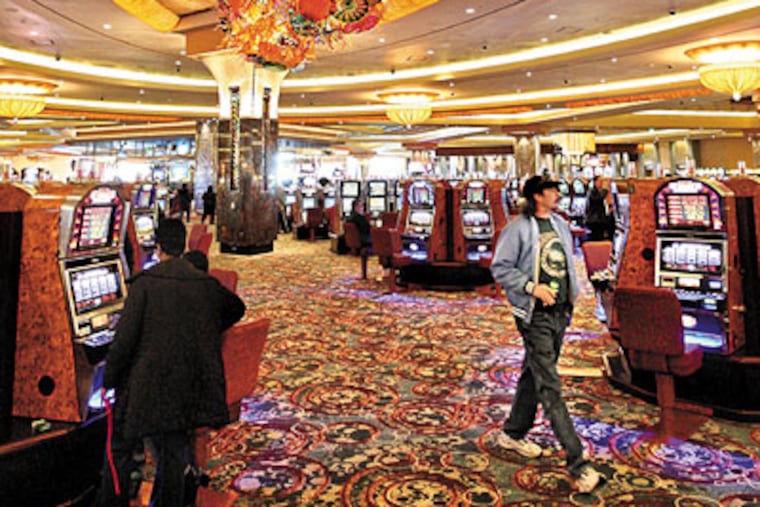National gambling revenue off 5.5 percent in '09
Carolann C. Howe of Warminster was spending more time at Parx Casino in Bucks County, but she said she was gambling hundreds of dollars less per month.

Carolann C. Howe of Warminster was spending more time at Parx Casino in Bucks County, but she said she was gambling hundreds of dollars less per month.
"I don't have the money," said the 61-year-old retiree.
Instead, Howe said, she relies more on free slots play from the casino, $60 to $80 worth of coupons a week, and her occasional winnings to keep coming back. "Whenever I win, I spread that out," Howe said on Friday, while working the penny slot machine at Parx.
National gross gambling revenues fell to $30.7 billion in 2009, a decrease of 5.5 percent from 2008 because of gamblers like Howe.
It marked the second consecutive year of declining casino revenues due to the recession and consumers' cutting back on discretionary and leisure spending. The findings were from the 2010 edition of State of the States: The American Gaming Association Survey of Casino Entertainment, released Thursday.
Nevada, the nation's largest gambling market by revenue, was down 10.4 percent in gaming revenue and down 10.0 percent in tax revenue; Mississippi was down 9.4 percent each in casino revenue and tax revenue.
But it was New Jersey - with its 11 casinos in Atlantic City - that had the largest decrease in both gaming revenue (down 13.3 percent) and tax revenue (down 18.6 percent) due to the weak economy and increased competition, mainly from Pennsylvania casinos.
In New Jersey, gross gambling revenue is taxed at 9.25 percent; Pennsylvania has a 55 percent tax on gross slots revenue.
Pennsylvania reported the largest revenue increase among the 13 states with commercial (as opposed to Indian) casinos - up 21.6 percent - as it continued to expand its industry and added two casinos last year: the Sands Casino Resort in Bethlehem and the Rivers Casino on Pittsburgh's waterfront.
"This past year was tough for all Americans, and it was tough for our business as well," said Frank J. Fahrenkopf Jr., president and CEO of the gaming association. "Nearly every industry that depends on consumer spending to succeed has been negatively impacted by the recession."
But no other U.S. gambling market saw its fortunes slide as drastically as Atlantic City's did last year. It has struggled since Pennsylvania opened its first casino in November 2006.
"Atlantic City, perhaps more than any other gaming site in the country, took it on the chin," Fahrenkopf said.
Many day-trip customers from Pennsylvania, particularly those who commuted from the Philadelphia suburbs to Atlantic City's casinos, now choose to gamble closer to home.
Such as Howe.
When her husband died in 2003, Howe said, her income was cut in half and she significantly reduced her gambling trips to Atlantic City. But that void was quickly filled by the much closer PhiladelphiaPark Casino & Racetrack - now Parx Casino. Howe is at the Bensalem casino at least two or three times a week.
"This is too close to home," she said sheepishly while waiting for a valet to retrieve her car Friday. She had just spent five hours there. "It's pretty bad when the valet knows me by name."
Inside, construction crews were busy preparing Parx's gaming floor for table games, which it hopes to have up and running this summer.
In January, Gov. Rendell signed legislation to legalize such games as blackjack, craps, and poker at Pennsylvania casinos to help balance this year's budget. Revenue on table games will be taxed at a lower rate - 16 percent. Table games are expected to bring in $250 million in new tax revenue for the state in this fiscal year. The commercial casinos in 13 states returned about $5.6 billion in revenue to state and local communities through direct gaming taxes, according to the association's annual report.
That pot is expected to grow, as Maryland gears up to open casinos this year, and Ohio by 2012.
But Robert Ward, deputy director of the Nelson A. Rockefeller Institute of Government in Albany, N.Y., said state governments are making a losing bet on gambling revenue as a way to plug budget deficits. "States are increasingly tempted to rely on new gambling revenue, but over time the revenue gains do not keep pace with growth in spending," Ward, who studies the impact of the economy on municipal and state funding at the State University of New York, said Friday. "So, while gambling may help in the short run, it does not solve long-term budget gaps."
Last year, casinos employed 328,377 people, down from 357,314 in 2008, a decrease of 8.1 percent.
Pennsylvania was one of only three states to report an increase in employment at its casinos: up 55.5 percent from 2008. New Jersey, on the other hand, had a 5.7 percent decrease in casino employment, shedding about 2,200 workers, going from 38,585 in 2008 to 36,377 last year.